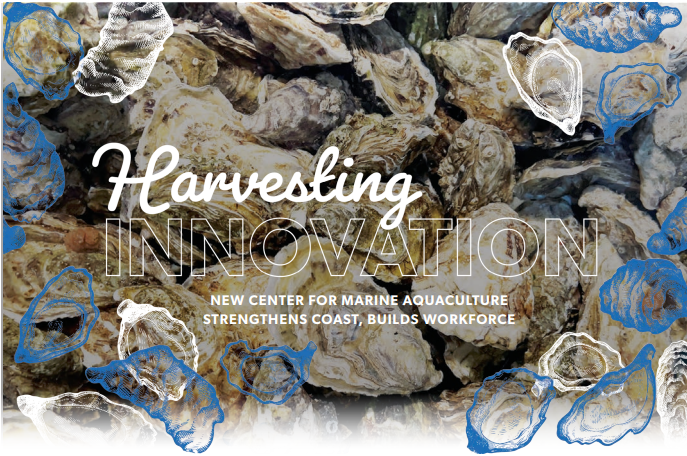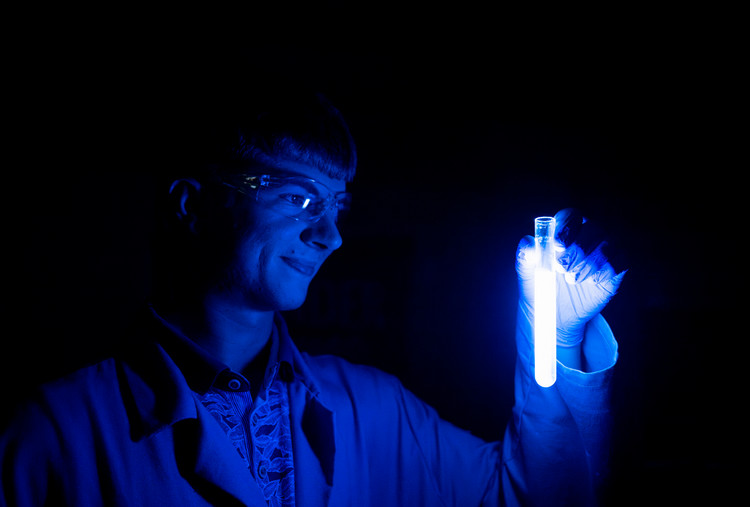Island University Biomedical Sciences Professor Awarded NIH Grant to Study How the Brain Controls, Remembers Our Reaction to Fear
CORPUS CHRISTI, Texas – When we experience fear, what happens inside our brains to help us react? Do we fight or flee? How can a deeper understanding of this process help lead to a better understanding of neurological conditions, such as post-traumatic stress disorder?
Research in the lab of Dr. Riccardo Mozzachiodi, Associate Professor of Neuroscience at Texas A&M University-Corpus Christi, is studying the much simpler brain of a marine snail to find answers. His lab combines biomedical research, marine biology, and neuroscience.
“A fundamental brain function necessary for survival is to balance the expression of defensive and non-defensive behaviors following an aversive experience,” Mozzachiodi said. “The overall goal of this proposal is to characterize the formation, storage and flexibility of this balance at the behavioral and neural-circuit levels. The acquired knowledge may ultimately provide important insights into those neurological disorders in which the correct balance between defensive and nondefensive behaviors is disrupted.”
In October, Mozzachiodi received an R15 Academic Research Enhancement Award (AREA) from the National Institutes of Health’s (NIH) National Institute of Neurological Disorders and Stroke (NINDS). The awards support research at educational institutions that have not been major recipients of NIH support yet grant baccalaureate degrees in biomedical sciences.
“Awards provide funding for small-scale, new, or ongoing health-related meritorious research projects, enhancing the research environment at eligible institutions and exposing students to research opportunities,” according to NIH.
The project titled “Characterization of the adaptive balance between defensive and appetitive behaviors induced by aversive experience” will provide Mozzachiodi $338,077 for the next three years to support undergraduate and graduate students working in his lab. A synopsis of the project for the public can be found at the NIH link: NINDS project_mozzachiodi. This grant is a continuation of Mozzachiodi’s work that was previously funded by NIH’s National Institute of General Medical Sciences.
Mozzachiodi and his team are studying the marine snail Aplysia californica. Its nervous system operates at a single-cell level in the same way as the human brain, but with only about 20,000 neurons instead of the billions found in the human brain.
“We are studying a very universal problem,” Mozzachiodi said. “How does an animal’s brain respond to fear and remember it? We are studying this problem in a relatively simple brain, so we can directly see changes happening at a cellular level in the neural circuits – the ensembles of brain cells that perform a specific function – that are affected by fear. We can then extrapolate the knowledge acquired in Aplysia to more complex organisms.”
In the lab, Mozzachiodi’s team will create a state of fear similar to what the snails would experience following a predator’s attack. The snails’ change in behavior – increased defenses and reduced feeding – are common throughout the animal kingdom. The project will examine how changes in neural circuits are altered by fear and describe underlying cellular and molecular mechanisms.
“The findings obtained from this line of work in the snail Aplysia seek to explain the logic behind the modulation of neural circuits in more complex animals, including humans” he said.
Mozzachiodi also explains that this research could lead to a better understanding of the role of neurotransmitters in the formation of fear.
“We’ve all heard of dopamine and serotonin,” he said. “Those molecules can be found in the brains of most animals, throughout the entire animal kingdom, including Aplysia the snail. Humans have more neurons, more circuits, but it is based on the same concepts. In this project, the role of different neurotransmitters in the brain circuits altered by fear will be investigated using behavioral cellular and pharmacological approaches.”
For the past 20 years, Mozzachiodi has studied snails and the link to more complex brains. His research previously received funding from the National Science Foundation and the National Institutes of Health.
Mozzachiodi joined the Texas A&M-Corpus Christi faculty in 2007. He received his Ph.D. in 1999 at the University of Pisa in Pisa, Italy, and was a post-doctoral fellow from 1999-2007 at the University of Texas-Health Science Center in Houston.








